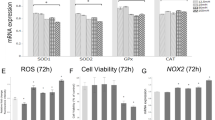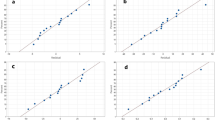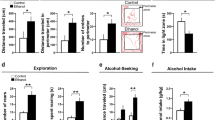Abstract
RECENT communications reporting a stimulation of growth in algae1,2 and in seedlings3 caused by added ethanol solutions have prompted us to report our findings of the ability of pea seedlings to oxidize alcohol which had accumulated under anaerobic conditions.
This is a preview of subscription content, access via your institution
Access options
Subscribe to this journal
Receive 51 print issues and online access
$199.00 per year
only $3.90 per issue
Buy this article
- Purchase on SpringerLink
- Instant access to full article PDF
Prices may be subject to local taxes which are calculated during checkout
Similar content being viewed by others
References
Bach, M. K., and Fellig, J., Nature, 182, 1359 (1958).
Street, H. E., Griffiths, D. L., Thresher, C. L., and Owens, M., Nature, 182, 1360 (1958).
Mer, C. L., Nature, 182, 1812 (1958).
Author information
Authors and Affiliations
Rights and permissions
About this article
Cite this article
COSSINS, E., TURNER, E. Utilization of Alcohol in Germinating Pea Seedlings. Nature 183, 1599–1600 (1959). https://doi.org/10.1038/1831599a0
Issue date:
DOI: https://doi.org/10.1038/1831599a0
This article is cited by
-
Production of Carbonyl Compounds by Tomato Fruit Tissue in the Presence of Aliphatic Alcohols
Nature (1966)
-
Formation and Metabolism of Lactic Acid during Germination of Pea Seedlings
Nature (1964)
-
Difference in the Metabolic Fate of Acetate and Ethanol fed to Higher Plant Tissues
Nature (1963)
-
Utilization of Ethanol-2-14C by Pea Slices
Nature (1962)



